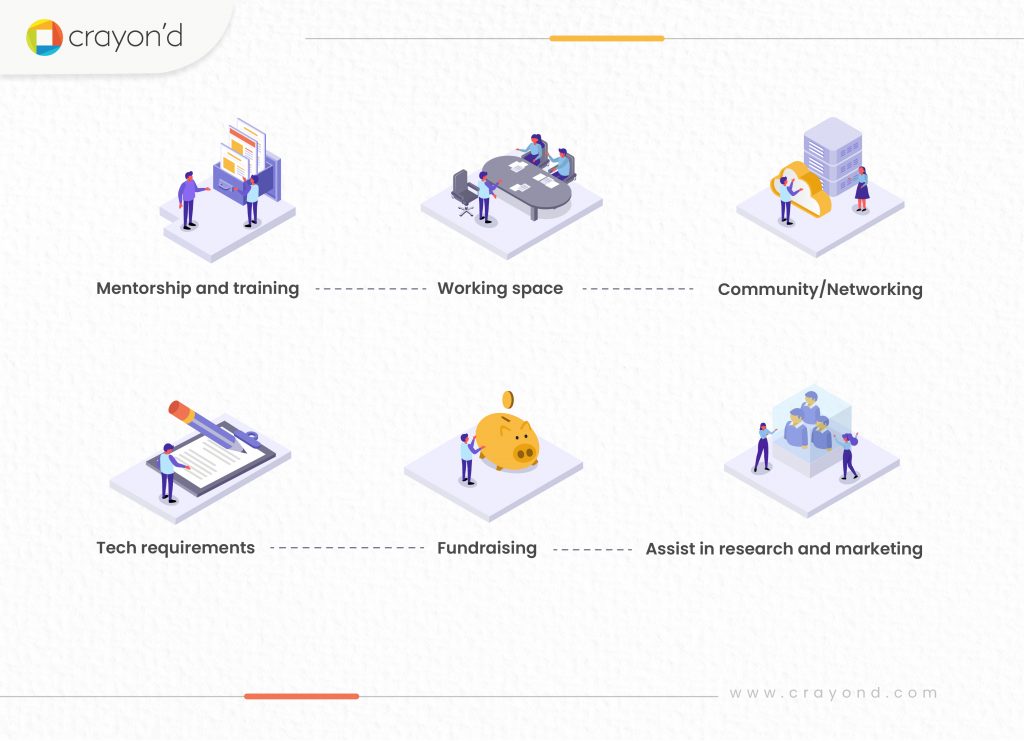Your startup idea is like a child. Well, time to call you ‘startup’ parents!
Here are some facts to attest to the above statement (Not the latter, no.)
Babies cannot grow up on their own. Can startup ideas come to life or scale up all by themselves? Babies need help in moving from one place to another. Similarly, startup ideas need people to take them places.
By now you’d have guessed where this analogy is headed.
Yes, right — the term ‘Incubators’.
Just like how the equipment can tend to a newborn, the startup incubators can nurture your fresh ideas.
Beginnings are always harder and more chaotic in entrepreneurship. You will be caught with too many responsibilities, each of them requiring near-perfect execution.
Dispersed attention with small initial teams is a challenging situation. And for new entrepreneurs, it would be tough to keep things afloat.
Incubators can lend a helping hand in dealing with these responsibilities, initially letting you focus on what is crucial at the moment— building the right product for the market.
We’ll see the hows and whys of startup incubators in this blog.
Time to get you from A to Z, shall we begin?
So, what are startup incubators?
New entrepreneurs often feel like they’re left blindfolded in a vast forest when getting started with their venture/business idea.
Startup incubators are organizations that help early-stage startups develop and grow their business. They provide new entrepreneurs the needed support through several services ranging from mentorship to resources.
The primary goal of incubators is to get the new startups up and running towards success. They can aid in areas like
- Developing a business model and plan
- Validating ideas
- Networking and building contacts.
They offer you the needed exposure, knowledge about the market, and entrepreneurship. But it doesn’t stop there. Incubator programs go a little further and teach how these nuances work for your business.
You can find incubators for different industries and niches, and the digital tech space is one.
Some of the popular incubators programs around the world are
Few incubators present in India include
- CIIE IIMA, Ahmedabad
- Khosla Labs, Bangalore
- NSRCEL, Bangalore
Startup incubators vs accelerators
The terms ‘incubators’ and ‘accelerators’ are used interchangeably on the web.
But that doesn’t mean they are the same thing. Accelerators and incubators both aid startups using different criteria and approaches.
- Startup accelerators look for companies with a validated idea or MVP to help them scale. Incubators help early-stage companies or entrepreneurs without a clear business model or validated idea.
- Accelerators invest capital(seed funding) in companies in exchange for an equity stake. Incubators generally don’t invest in startup companies (few exceptions prevail). However, they might ask for an equity stake for the resources provided.
- Accelerators have a strict time frame for their program, usually 3-6 months. Incubators are more open-ended without a stringent timeline allowing long-term.
Types of startup incubators

- Non-profit organizations or Government: These incubators programs are conducted by the government or non-profit organizations. They back the startups intending to bring economic development to the specific region. These incubators usually look for ventures that are inclined more towards public welfare or social upliftment.
- Academy or university: These are run by universities or colleges. They do it with a motive to support the entrepreneurial mindset of students. However, they accept the public applications from young aspirants alongside the internal ones created by the student entrepreneurs.
- Private: Private venture capitalist firms run incubator programs to take up investment opportunities. They provide initial capital for the startups in addition to the training.
- Corporate: These incubator programs are conducted by MNCs. They target both internal and external projects. Such projects are mostly sought for the benefit they bring to the organization— technology development, partnerships, etc.
How do startup incubators work?
The strategies and working vary from one incubator to another, depending on their area of focus.
Accelerators are more sought-after than incubators. This, alongside their stringent selection process, makes it very difficult for new startups to enter a program. Incubators are relatively easier to get into but there are still a few things you need to keep in mind.
The startups/new entrepreneurs need to fill out the details about themselves, their business, and its objectives. Some incubators may even ask for a business plan you have in mind.
It is followed by an interview for understanding the viability of your idea, your business needs, and your experience. They also determine the sincerity and passion you have for your startup idea. Interviews are generally short. It may happen either in person or virtually.
The incubator team then scrutinizes your application to see if it fits into their forte. You’ll receive the response within the mentioned time frame.
After getting admitted to the incubator program, you need to move to the location in the case of physical training. The program may happen either physically or virtually. The training span can range from a few months to years.
Now that brings us to the vital question/doubt — Where does their cash flow come from? Most incubator programs are backed by revenue sources based on their types — from universities, corporates, and the government. Some have partnerships with investors, while some get equity from the startups they incubate. In a few cases, the programs also have sponsors.
Services provided by startup incubators

1. Mentorship and training
Startups need to understand various facets of business like finance and expense management, team structuring, legal requirements, human resources management, etc. Startup incubators can lend help through advisors who can mentor you.
They also provide access to a network of mentors, coaches, and industry experts. It can help you with other chief aspects like idea validation, customer knowledge, problem-solving, decision-making, and much more. Development is another angle where their mentorship can aid you.
In short, these mentors handle things for you in the beginning. And, they’ll impart the knowledge you will need as a business owner.
2. Working space
Collaboration is essential for… uh… well, all companies. But in the case of early-stage startups, it’s crucial for building the base right. Startup incubators (the physical programs) ensure collaboration happens by providing co-working office spaces at a low cost. It will help reduce your operational costs.
3. Community/Networking
Incubators have other startups as well in their programs. It can help you gain a network of fellows, new entrepreneurs, and startup ventures. You’ll be sharing office spaces and resources, paving the way for relationships. It is the beginning of strategic partnerships that might happen in the future.
If that’s one kind, incubators themselves arrange networking events. It will connect you with their reliable partners. The partners are usually industry leaders and successful entrepreneurs. Networking is how you get exposed to the world of entrepreneurship. It comes with the benefits of business knowledge and contacts.
4. Tech requirements
Incubators take care of the technical requirements like high-speed internet, servers, and other necessary equipment like printers, scanners, office supplies, etc.
They also provide the required tech tools or products needed for MVP or prototype development. You can also access valuable resources or materials to enhance your business idea.
5. Fundraising
Remember the partnerships with investor networks we mentioned before? That comes in handy for the enrolled startups. Incubators will facilitate the meeting with the investors and also help you build credibility through these interactions. You can develop a killer pitch to present to the investors with the incubators’ guidance.
6. Assist in research and marketing
Initial product strategy needs market research, customer segments understanding, and competitor knowledge. This wisdom helps in their later marketing efforts too.
Incubators will teach these principles as a part of their training. They can help you implement it into every aspect of product management. While the incubators don’t directly help with marketing initiatives, these principles lay the foundation needed.
How to find the right incubator for your startup?
Incubators possess all of these benefits, however, they have their downsides as well.
The flexibility in the time frame might seem like an advantage. But what if it slows you down and doesn’t bring in the needed momentum at the start? The coworking spaces may affect your focus through distractions and your privacy. Some might not fit inside the place and its rules.
You need to consider all of this before you decide to go on with the incubator programs. First, see if the offerings of incubator programs are what your startup needs right now. The evaluation will bring you to the decision of yes/no for an incubator.
If yes, then your next crucial task is choosing the right incubator. Here are some criteria you can use for the selection.
1. See their networks
Startups need the right networks in the longer run. Go through the networks the incubators have and if they are relevant to your needs.
2. Look at their curriculum
Incubators have a planned curriculum — training areas, schedules, and various events. See if it aligns with your objectives and business needs. Assess if you and your team can endure it and can bring out your full potential.
3. Study the mentors
The mentors taking part are a very important part of the incubator program. It depends on them whether you make it or break it. As much as the right mentors can bring in impactful changes, the wrong ones can affect your company’s initial and future state. Check out the mentors’ list — their skills, area of expertise, network, and experiences.
4. Check out the location details
Incubator programs (most of them) demand physical presence throughout the program. This means you and your team need to move to the location. Check out the distance from your home and relocating feasibility.
5. Analyze their track records
Have the incubators trained someone from your industry or niche before? Well, it adds to their experience in training your team. You can also ask for feedback and opinions from the alumni of the program. They give you a glimpse of their time at the program and if it was really helpful.
Endnote
A new entrepreneur needs to catch hold of people and business management skills right from the beginning. If not, it gets complicated when the company needs to scale up. Incubators ensure that new entrepreneurs and young startup founders acquire these skills.
Incubators can drive your startup to reach higher levels. But it all comes down to choosing the right incubator and understanding your needs. That doesn’t stop with the right choice.
No matter how effective the program is, only your efforts and involvement can make a difference. Incubators will provide you with all the possible opportunities to develop, grow and win. But it’s up to you to go ahead and make use of them.
Fast learning and safe failure is other huge advantage of incubator programs. With such circumstances, you must take up ownership and attempt various ventures.
Business cannot be built alone. You require people and networks. Making the most out of the networking chances should be your other goal.
Finally — It’s always the two-side efforts that lead you to success.







Add comment